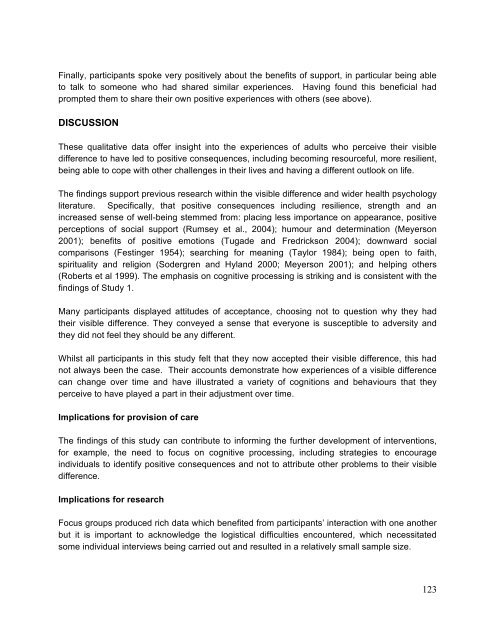Download the report - The Healing Foundation
Download the report - The Healing Foundation
Download the report - The Healing Foundation
You also want an ePaper? Increase the reach of your titles
YUMPU automatically turns print PDFs into web optimized ePapers that Google loves.
Finally, participants spoke very positively about <strong>the</strong> benefits of support, in particular being able<br />
to talk to someone who had shared similar experiences. Having found this beneficial had<br />
prompted <strong>the</strong>m to share <strong>the</strong>ir own positive experiences with o<strong>the</strong>rs (see above).<br />
DISCUSSION<br />
<strong>The</strong>se qualitative data offer insight into <strong>the</strong> experiences of adults who perceive <strong>the</strong>ir visible<br />
difference to have led to positive consequences, including becoming resourceful, more resilient,<br />
being able to cope with o<strong>the</strong>r challenges in <strong>the</strong>ir lives and having a different outlook on life.<br />
<strong>The</strong> findings support previous research within <strong>the</strong> visible difference and wider health psychology<br />
literature. Specifically, that positive consequences including resilience, strength and an<br />
increased sense of well-being stemmed from: placing less importance on appearance, positive<br />
perceptions of social support (Rumsey et al., 2004); humour and determination (Meyerson<br />
2001); benefits of positive emotions (Tugade and Fredrickson 2004); downward social<br />
comparisons (Festinger 1954); searching for meaning (Taylor 1984); being open to faith,<br />
spirituality and religion (Sodergren and Hyland 2000; Meyerson 2001); and helping o<strong>the</strong>rs<br />
(Roberts et al 1999). <strong>The</strong> emphasis on cognitive processing is striking and is consistent with <strong>the</strong><br />
findings of Study 1.<br />
Many participants displayed attitudes of acceptance, choosing not to question why <strong>the</strong>y had<br />
<strong>the</strong>ir visible difference. <strong>The</strong>y conveyed a sense that everyone is susceptible to adversity and<br />
<strong>the</strong>y did not feel <strong>the</strong>y should be any different.<br />
Whilst all participants in this study felt that <strong>the</strong>y now accepted <strong>the</strong>ir visible difference, this had<br />
not always been <strong>the</strong> case. <strong>The</strong>ir accounts demonstrate how experiences of a visible difference<br />
can change over time and have illustrated a variety of cognitions and behaviours that <strong>the</strong>y<br />
perceive to have played a part in <strong>the</strong>ir adjustment over time.<br />
Implications for provision of care<br />
<strong>The</strong> findings of this study can contribute to informing <strong>the</strong> fur<strong>the</strong>r development of interventions,<br />
for example, <strong>the</strong> need to focus on cognitive processing, including strategies to encourage<br />
individuals to identify positive consequences and not to attribute o<strong>the</strong>r problems to <strong>the</strong>ir visible<br />
difference.<br />
Implications for research<br />
Focus groups produced rich data which benefited from participants’ interaction with one ano<strong>the</strong>r<br />
but it is important to acknowledge <strong>the</strong> logistical difficulties encountered, which necessitated<br />
some individual interviews being carried out and resulted in a relatively small sample size.<br />
123


